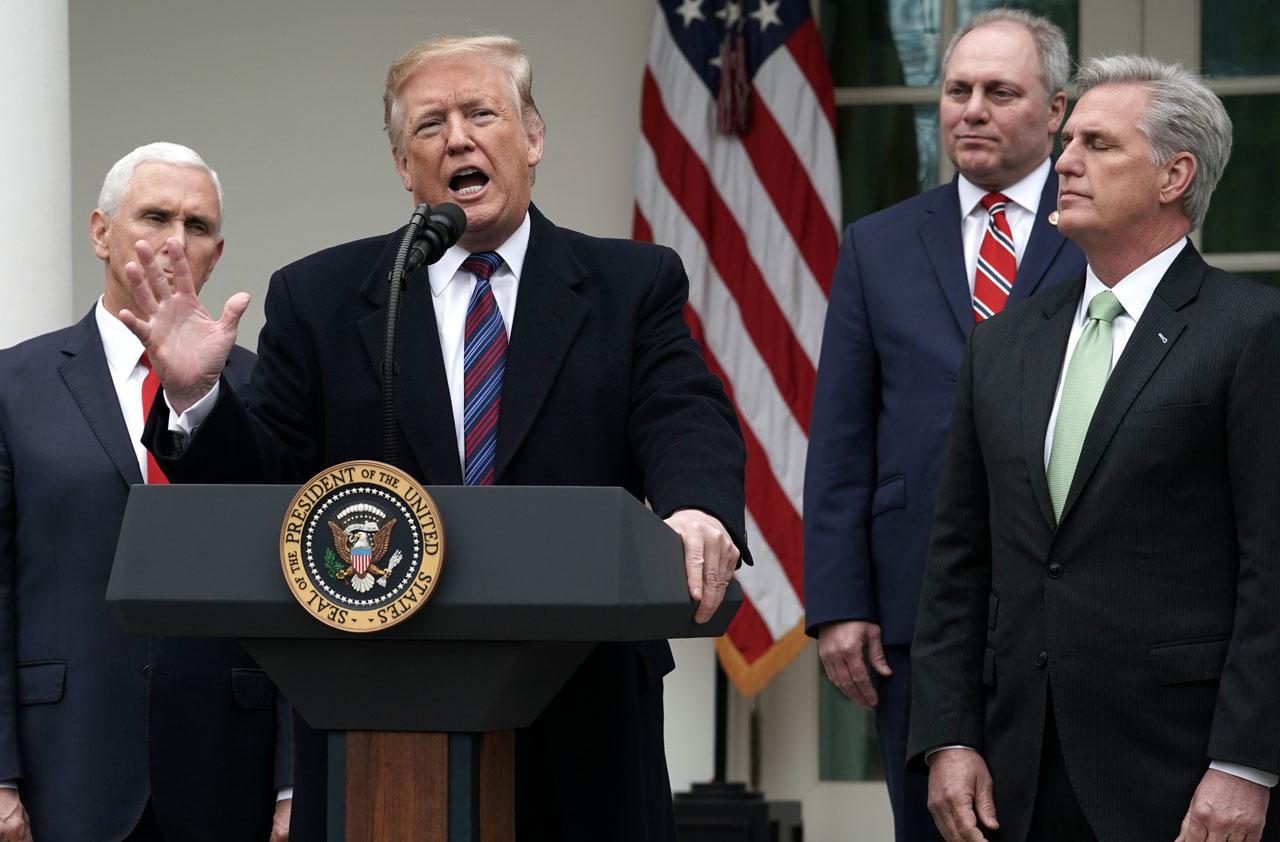Trump's Sweeping New Tariffs Rattle Wall Street, Main Street
Trump is promising that the short-term pain of steep new tariffs on imports will spark a manufacturing renaissance. But they pose major risks in the near term.

Profit and prosper with the best of Kiplinger's advice on investing, taxes, retirement, personal finance and much more. Delivered daily. Enter your email in the box and click Sign Me Up.
You are now subscribed
Your newsletter sign-up was successful
Want to add more newsletters?

Delivered daily
Kiplinger Today
Profit and prosper with the best of Kiplinger's advice on investing, taxes, retirement, personal finance and much more delivered daily. Smart money moves start here.

Sent five days a week
Kiplinger A Step Ahead
Get practical help to make better financial decisions in your everyday life, from spending to savings on top deals.

Delivered daily
Kiplinger Closing Bell
Get today's biggest financial and investing headlines delivered to your inbox every day the U.S. stock market is open.

Sent twice a week
Kiplinger Adviser Intel
Financial pros across the country share best practices and fresh tactics to preserve and grow your wealth.

Delivered weekly
Kiplinger Tax Tips
Trim your federal and state tax bills with practical tax-planning and tax-cutting strategies.

Sent twice a week
Kiplinger Retirement Tips
Your twice-a-week guide to planning and enjoying a financially secure and richly rewarding retirement

Sent bimonthly.
Kiplinger Adviser Angle
Insights for advisers, wealth managers and other financial professionals.

Sent twice a week
Kiplinger Investing Weekly
Your twice-a-week roundup of promising stocks, funds, companies and industries you should consider, ones you should avoid, and why.

Sent weekly for six weeks
Kiplinger Invest for Retirement
Your step-by-step six-part series on how to invest for retirement, from devising a successful strategy to exactly which investments to choose.
To help you understand what is going on in politics and the economy, our highly experienced Kiplinger Letter team will keep you abreast of the latest developments and forecasts (Get a free issue of The Kiplinger Letter or subscribe). You'll get all the latest news first by subscribing, but we will publish many (but not all) of the forecasts a few days afterward online. Here’s the latest…
Prepare for slower growth and higher inflation as the president seeks to revise the global trade system through sweeping tariffs on virtually all U.S. imports. He is promising short-term pain for long-term gain. We agree on the short term. The long term is murkier. Given the highest U.S. tariffs in a century:
Prices of many goods will turn higher. Sellers of imported goods will absorb some of the new duties and pass along the rest to their overseas suppliers and to U.S. consumers. The exact breakdown will vary by product and industry, but the trend is inflationary.
Overall inflation could hit 5% by year-end, up from 2.8% in February, but not as bad as the 9% peak that the economy endured in 2022. Still, for businesses and consumers alike, steeper price hikes will hurt.
Spending will suffer, at the retail level because shoppers’ dollars won’t stretch as far now, and among businesses because of the uncertainty about how long the tariffs will last. The White House wants companies to invest in new manufacturing here. Some will — indeed, some already are — but other firms are likely to hold off. Building new factories is costly and can take years, a major risk if tariffs then get reversed by Trump or his successor.
Recession doesn’t appear imminent. But there is a real threat of stagflation — the dreaded combo of slow growth and stubbornly high inflation, last seen in the 70s. Of course, the exact impact of the new tariffs depends on reactions to them.
Trade partners must decide whether to negotiate, stand pat or push back. We expect a mix of reactions there.
From just $107.88 $24.99 for Kiplinger Personal Finance
Become a smarter, better informed investor. Subscribe from just $107.88 $24.99, plus get up to 4 Special Issues

Sign up for Kiplinger’s Free Newsletters
Profit and prosper with the best of expert advice on investing, taxes, retirement, personal finance and more - straight to your e-mail.
Profit and prosper with the best of expert advice - straight to your e-mail.
- China will almost certainly retaliate. It faces the highest combined duties, well over 50%. And while the U.S. is a key market that China can ill afford to lose, Beijing also can’t afford to appear cowed by Trump. Look for it to respond by targeting sensitive U.S. products, especially foodstuffs.
- The European Union may well also push back as it faces 20% U.S. duties.
- For now, Australia, India and possibly the U.K. appear unlikely to retaliate.
- Smaller countries facing steep tariffs may have no choice but to negotiate by dropping their own duties on U.S. goods. Vietnam, for instance, depends heavily on exports to the U.S., and now faces a punishing 46% rate. That may be unbearable.
- Mexico and Canada, spared new duties, may also look to make deals. USMCA, the free-trade pact Trump made with them in his first term, is up for renewal in 2026. He appears open to extending it if he gets concessions on migration and other issues.
The big question: Will Trump succeed and bring back U.S. manufacturing?
He is determined to try. But there are limits to what any president can do. Consumers are also voters, and even voters who support him may blanch at the cost tariffs will add to what they buy. Some foreign leaders will bet we can’t take the pain.
This forecast first appeared in The Kiplinger Letter, which has been running since 1923 and is a collection of concise weekly forecasts on business and economic trends, as well as what to expect from Washington, to help you understand what’s coming up to make the most of your investments and your money. Subscribe to The Kiplinger Letter.
Related content
- What’s Happening With Trump Tariffs? Full Updates and Analysis
- How Tariffs Could Impact Affluent Retirees
- Trump's Tariffs on Canada and Mexico to Spike Food, Gas Prices
Profit and prosper with the best of Kiplinger's advice on investing, taxes, retirement, personal finance and much more. Delivered daily. Enter your email in the box and click Sign Me Up.

Jim joined Kiplinger in December 2010, covering energy and commodities markets, autos, environment and sports business for The Kiplinger Letter. He is now the managing editor of The Kiplinger Letter and The Kiplinger Tax Letter. He also frequently appears on radio and podcasts to discuss the outlook for gasoline prices and new car technologies. Prior to joining Kiplinger, he covered federal grant funding and congressional appropriations for Thompson Publishing Group, writing for a range of print and online publications. He holds a BA in history from the University of Rochester.
- Rodrigo Sermeño, The Kiplinger Letter
- David PayneStaff Economist, The Kiplinger Letter
-
 Quiz: Do You Know How to Avoid the "Medigap Trap?"
Quiz: Do You Know How to Avoid the "Medigap Trap?"Quiz Test your basic knowledge of the "Medigap Trap" in our quick quiz.
-
 5 Top Tax-Efficient Mutual Funds for Smarter Investing
5 Top Tax-Efficient Mutual Funds for Smarter InvestingMutual funds are many things, but "tax-friendly" usually isn't one of them. These are the exceptions.
-
 AI Sparks Existential Crisis for Software Stocks
AI Sparks Existential Crisis for Software StocksThe Kiplinger Letter Fears that SaaS subscription software could be rendered obsolete by artificial intelligence make investors jittery.
-
 Trump $10B IRS Lawsuit Hits an Already Chaotic 2026 Tax Season
Trump $10B IRS Lawsuit Hits an Already Chaotic 2026 Tax SeasonTax Law A new Trump lawsuit and warnings from a tax-industry watchdog point to an IRS under strain, just as millions of taxpayers begin filing their 2025 returns.
-
 The New Fed Chair Was Announced: What You Need to Know
The New Fed Chair Was Announced: What You Need to KnowPresident Donald Trump announced Kevin Warsh as his selection for the next chair of the Federal Reserve, who will replace Jerome Powell.
-
 Trump Reshapes Foreign Policy
Trump Reshapes Foreign PolicyThe Kiplinger Letter The President starts the new year by putting allies and adversaries on notice.
-
 Congress Set for Busy Winter
Congress Set for Busy WinterThe Kiplinger Letter The Letter editors review the bills Congress will decide on this year. The government funding bill is paramount, but other issues vie for lawmakers’ attention.
-
 The December CPI Report Is Out. Here's What It Means for the Fed's Next Move
The December CPI Report Is Out. Here's What It Means for the Fed's Next MoveThe December CPI report came in lighter than expected, but housing costs remain an overhang.
-
 The Kiplinger Letter's 10 Forecasts for 2026
The Kiplinger Letter's 10 Forecasts for 2026The Kiplinger Letter Here are some of the biggest events and trends in economics, politics and tech that will shape the new year.
-
 Special Report: The Future of American Politics
Special Report: The Future of American PoliticsThe Kiplinger Letter Kiplinger assesses the political trends and challenges that will define the next decade.
-
 The November CPI Report Is Out. Here's What It Means for Rising Prices
The November CPI Report Is Out. Here's What It Means for Rising PricesThe November CPI report came in lighter than expected, but the delayed data give an incomplete picture of inflation, say economists.